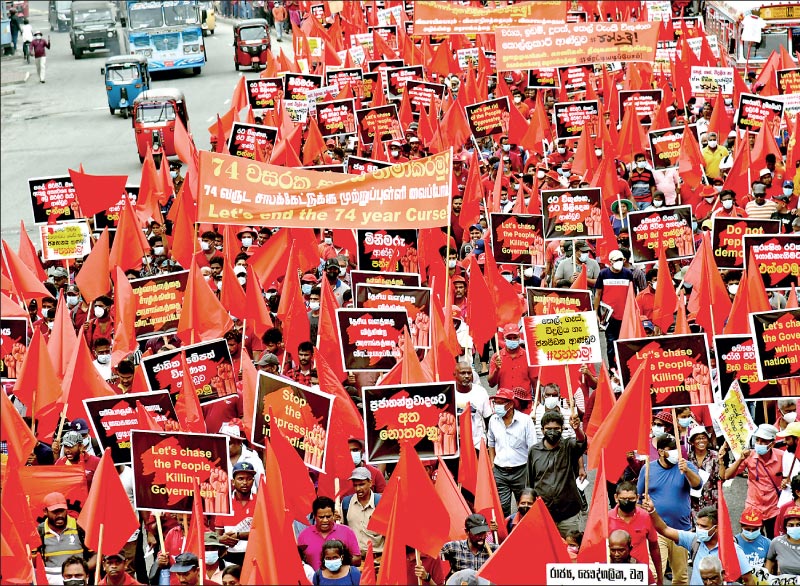Monday Feb 16, 2026
Monday Feb 16, 2026
Monday, 23 May 2022 02:18 - - {{hitsCtrl.values.hits}}

 This month we marked May Day, perhaps not in the usual way as there were many constraints to the normal parades. However, the unions, or at least some of them, joined the ‘Gota Go Gama’, signifying that the cause which was agitating the country had both a political and a socio-economic impact touching their lives. The tragic economic plight employees find themselves in today started with COVID and the disruption of economic activity, which was then exacerbated, by the economic mess we are in caused by bad governance. Employees have little or no transport to get to work and their employers have had their supply chains disrupted making it a challenge to keep their businesses going. It is hoped that some at least of the essential items to keep the economy active are revived quickly.Everyone is responsible for this economic mess. Why do I say so? The politicians whom we want to send home are our own elected representatives. Ironically, the Prime Minister is not one of them, having emerged thanks to his party having being allocated a seat as a nominated representative! The business community is responsible as much as anyone else as it has its associations and chambers which should have been in the forefront of fighting the battle for ensuring that the so called engine of growth (now the engine of survival?) was not stuttering! Sadly the significant players in the business community, play along with politicians because it has become the culture of the country to cultivate politicians to thrive. It is sad that sometimes one cannot survive in this veritable jungle where the political beasts will destroy you unless you play their game!A proper Industrial Relations climate is needed in the country. Dunlop, an economist, in his theory on Industrial Relations identified the three integral members of labour relations as labour, management and government, and stressed the need for agreement on a common set of facts that affect, or are affected, by labour, management and government. If we need an example of how this could work we could look at Singapore where the Government, NTUC and Employers Organisations work together in resolving economic challenges and ensuring prosperity. Dunlop proposed that instead of leaving things to chance that the relationship of the three parties should follow logic, and work to avoid disruption by selfish interests that would be against the economic interest of the whole of society.In the public and semi-public sector hundreds of unions which have political affiliations, representing all levels of employees – even professionals – exist. There is a need for a strong national federation of unions. The benefit of a single trade union federation is that it could be fair by all employees irrespective of departments and institutions, and unify disparate interests. Unions must keep in mind that they have an obligation to support the country and its economy and contribute to the sustenance of their employment. The shedding of party politics from trade unionism will also result in workers having an opportunity of electing people to Parliament who will represent their interests in an independent manner.
This month we marked May Day, perhaps not in the usual way as there were many constraints to the normal parades. However, the unions, or at least some of them, joined the ‘Gota Go Gama’, signifying that the cause which was agitating the country had both a political and a socio-economic impact touching their lives. The tragic economic plight employees find themselves in today started with COVID and the disruption of economic activity, which was then exacerbated, by the economic mess we are in caused by bad governance. Employees have little or no transport to get to work and their employers have had their supply chains disrupted making it a challenge to keep their businesses going. It is hoped that some at least of the essential items to keep the economy active are revived quickly.Everyone is responsible for this economic mess. Why do I say so? The politicians whom we want to send home are our own elected representatives. Ironically, the Prime Minister is not one of them, having emerged thanks to his party having being allocated a seat as a nominated representative! The business community is responsible as much as anyone else as it has its associations and chambers which should have been in the forefront of fighting the battle for ensuring that the so called engine of growth (now the engine of survival?) was not stuttering! Sadly the significant players in the business community, play along with politicians because it has become the culture of the country to cultivate politicians to thrive. It is sad that sometimes one cannot survive in this veritable jungle where the political beasts will destroy you unless you play their game!A proper Industrial Relations climate is needed in the country. Dunlop, an economist, in his theory on Industrial Relations identified the three integral members of labour relations as labour, management and government, and stressed the need for agreement on a common set of facts that affect, or are affected, by labour, management and government. If we need an example of how this could work we could look at Singapore where the Government, NTUC and Employers Organisations work together in resolving economic challenges and ensuring prosperity. Dunlop proposed that instead of leaving things to chance that the relationship of the three parties should follow logic, and work to avoid disruption by selfish interests that would be against the economic interest of the whole of society.In the public and semi-public sector hundreds of unions which have political affiliations, representing all levels of employees – even professionals – exist. There is a need for a strong national federation of unions. The benefit of a single trade union federation is that it could be fair by all employees irrespective of departments and institutions, and unify disparate interests. Unions must keep in mind that they have an obligation to support the country and its economy and contribute to the sustenance of their employment. The shedding of party politics from trade unionism will also result in workers having an opportunity of electing people to Parliament who will represent their interests in an independent manner.
The probability of job losses in the public sector looms large with inevitable restructuring which is on the cards. One answer is to have a retraining program which would enhance the employability of those displaced, whilst the obvious one is the availability of compensation. The latter should also be coupled with some opportunities for proper investment so that they do not waste their compensation. In Singapore a key task of the NTUC is retraining employees and helping them to upgrade their skills.
In May 1886, the growing tensions between labour and capital in the US saw violence during a protest rally in Chicago’s Haymarket Square. Eight persons were convicted on murder charges and four were executed. In 1893, during a nationwide recession George Pullman laid off hundreds of employees and cut wages for the remaining workers. Pullman also refused to lower rents of his employees who lived in quarters provided by him. Finally, troops dealt with a strike by the railroad workers which left some 30 dead. In July 1894 the US President created the ‘labour day’.
The historical perspective I think is a reminder of how a refusal by an employer to be empathetic and sensible in a disastrous situation can lead to great violence! A good example for us to keep in mind at this time when workers are more than angry at how the economic mess has affected their lives. Employees have to cooperate with their employers for which they need transparency with regard to management and decision-making which affect their lives. Employers in turn, have to be socially responsible.
It is a reality that at least in the private sector after the general strike of July 1980, the enthusiasm for general issues to motivate workers to take strike action, is absent. The rate of unionisation has also seen a decline. Unions are now in the current context in a position to find a national cause which would unify workers and increase interest in collective power at the workplace. Employers therefore need to have a constant dialogue with employees on how the external environment is impacting on the business.
The need for a social safety net serves as a common ground which also concerns employers who cannot provide such security except by contributing to government regulated funds such as the EPF/ETF. Unions should focus on facilitating social protection and should refrain from any stand which prevents damage to the economy through targeting individual employers who are vulnerable and would definitely be destroyed by industrial action at this critical juncture.
The British employers in Ceylon, being accustomed to an employment environment of Collective Bargaining set up the Employers Federation of Ceylon in 1929 as part of the Ceylon Chamber to deal with Industrial Relations issues and through the process of Collective Bargaining to ensure industrial peace in the country. In the initial period, collective bargaining was for trade sectors but over a period of time with the need to focus more on the individual workplaces and their capacity to pay, collective bargaining became decentralised.
In July 1980 as stated earlier, unions suffered as a result of taking up national issues and subsequent events saw branch unions becoming more organised to deal with their internal bargaining. It also resulted in employers sharing more information about their business plans and being conscious about the appropriateness of its management processes. The Human Resource was identified as a key part of the business and every well-performing business had a dialogue with employees through clear communication strategies.
Unfortunately, in the public sector arbitrary decisions taken by politicians prevent an open dialogue. The lack of adherence to established processes, are the cause of many disputes. The unions which are affiliated to the Government get benefits at the expense of others! The Government must learn from its bitter experience of industrial unrest.
To sum up, we need to be conscious of the rights and obligations of the social partners and that issues which impinge on a workplace are addressed in a sensible manner, only at the workplace, and in a manner which is beneficial to all.